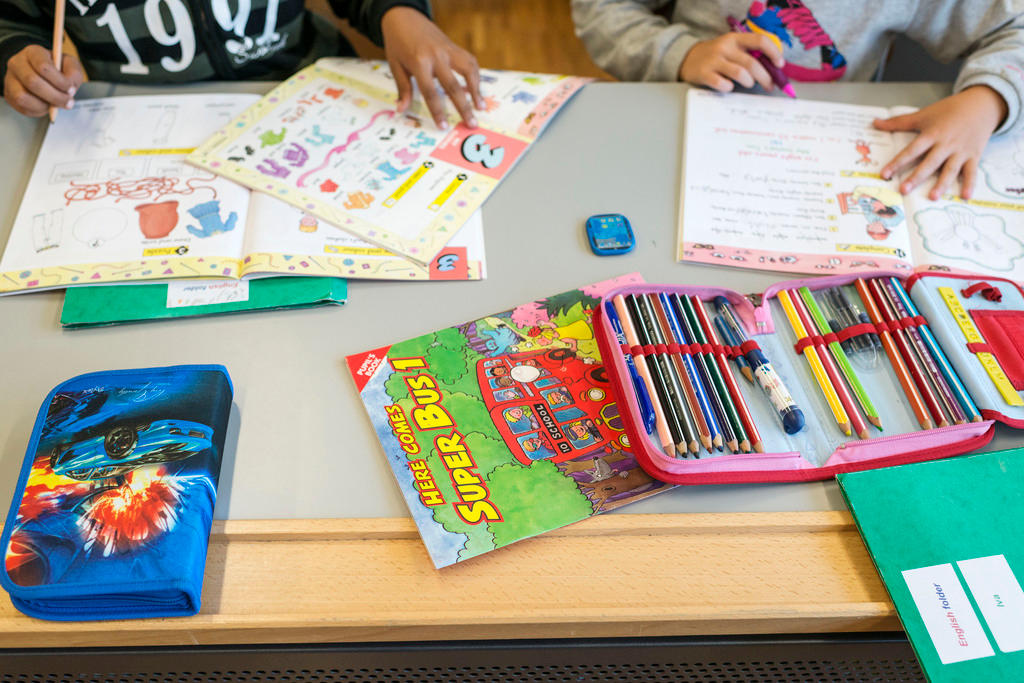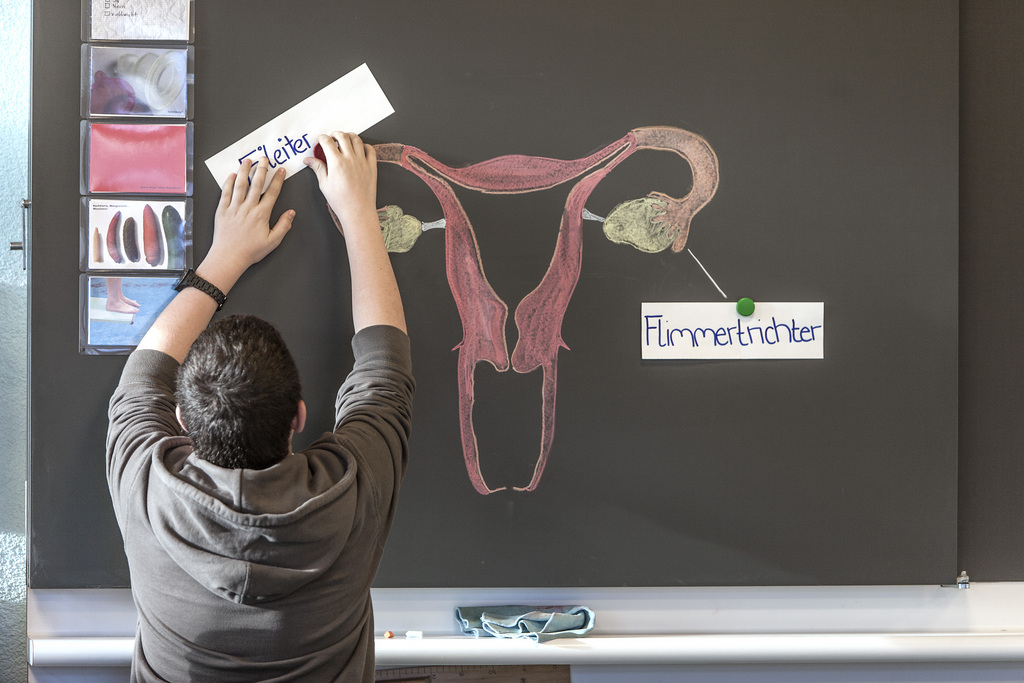Why Swiss schools have a say in sex education

Teachers should be able to react to children’s questions about sex in an age-appropriate way when necessary, Beat Zemp, the head of the Federation of Swiss TeachersExternal link, says. His comments follow a European court decision that a child in Basel should not be exempt from sex education lessons.
In a ruling released on January 18, the European Court of Human Rights (ECHR)External link in Strasbourg rejected the Basel family’s application that their child should not attend sex education classes in primary school. The court argued that the early years of sex education were complementary and not systematic and that teachers “merely had to ‘react to the children’s questions and actions’.”
The case has provoked an emotional debate in Switzerland about sex education in schools. For teachers, lessons are all about preventing abuse, but more conservative circles think they promote early sexualisation.
This is not the first time parents have resorted to the justice system for school-related issues. Previous court cases have concerned exemption from Christmas carol singing or swimming lessons.

swissinfo.ch: Was does the ECHR decision mean for teaching?
Beat Zemp: The ECHR has only given its opinion on this particular case in canton Basel City. But the judgement has a standardising effect.
swissinfo.ch: And that means?
B.Z.: …That other cantons, which run sex education classes in primary school in a similar way to Basel City will be protected by this decision. The Swiss Federal Court had already said that there should be no exemption from sex education if this is done in a school-level and situation-appropriate way. This is important and both conditions are correctly applied in Basel City.
swissinfo.ch: What does ‘school-level and situation-appropriate’ mean exactly?
B.Z.: School level-appropriate means for example, that teaching materials featuring genitals – such as using the ‘sex box’ with the wooden penis and soft fabric vagina – are not suitable for early years lessons, but are for teenagers in the secondary 1 level [c.age 13].
Situation-appropriate means, for example, that if the question of where babies come from arises in class because the teacher is pregnant, or if the class finds a condom in the playground, that teachers could then address this briefly at the beginning of a lesson, without doing anything criminal. It would be a real educational failure if teachers were forbidden from answering questions like this from children in an age-appropriate way.
Controversial ‘sex box’
Seven years ago canton Basel City caused a furor – particularly in conservative circles – when it introduced a new concept for sex education classes. The main problem was the ‘sex box’ which contained a wooden penis and a soft fabric vagina that was distributed to schools. The box is no longer in use but sex education continues in the canton.
swissinfo.ch: Many parents think that sex education is their job and not the school’s. What is your view?
B.Z.: The main aim is to protect children from sexual abuse. In Kindergarten, children should already be aware that ‘my body belongs to me’ and that ‘there is good and bad touching’. By Upper School, you can add in protection from sexually-transmitted diseases. These two risks justify why schools should be allowed to interfere in how parents teach their children about sex. This opinion has been protected by the Swiss Federal Court ruling and now by the ECHR.
swissinfo.ch: There are people with very different cultural backgrounds living in Switzerland. Surely there will be conflict with some parents if sex education is carried out systematically from the fifth year of primary school [around age 11]?
B.Z.: We explain when we talk to parents and at parents’ evenings what exactly the aim of the lesson is, what the topics are and how they will be taught and explain that no sexual orientation or practice will be imposed on anyone. It’s all about winning parents’ trust. This works in most cases if you have an open information policy.
swissinfo.ch: There seems to have been a run on court rulings on school issues of late: on swimming lessons, carol singing, religious symbols and whether mobile phones should be allowed. Are teachers now at risk of spending half their time in court?
B.Z.: There are parents who won’t be swayed by any arguments and take their point of view through all the courts, sometimes even up to the ECHR. And this unfortunately encourages others to go to court with similar cases.
It does become a problem though when the higher courts have to deal with education issues like the Basel case on sex education, or the case of a Muslim father who just could not accept [the ruling], who was subject to fines and court costs of several thousand Swiss francs and who even ended up in prison because he could not pay them. And this was only because he wanted to prevent his daughter taking part in swimming lessons. I have no understanding for this at all.
Christmas singing in court
Earlier this month, a regional court in Dietikon in canton Zurich considered the case of a Muslim father who wanted to prevent his three sons from taking part in the dress rehearsal for Christmas carol singing at their school in December 2016. His sons had been exempted for the actual concert, but not for the rehearsals in the church. As he refused to send his sons to the rehearsals, which took place during school time, he was fined CHF500 ($527) by the local authorities for breach of parental responsibility. The father had his appeal rejected by the court. He says he will continue his legal fight and has received support from a controversial organisation, the Salafist group Swiss Central Islamic Council (SCIS).
Translated from German by Isobel Leybold-Johnson

In compliance with the JTI standards
More: SWI swissinfo.ch certified by the Journalism Trust Initiative



You can find an overview of ongoing debates with our journalists here. Please join us!
If you want to start a conversation about a topic raised in this article or want to report factual errors, email us at english@swissinfo.ch.